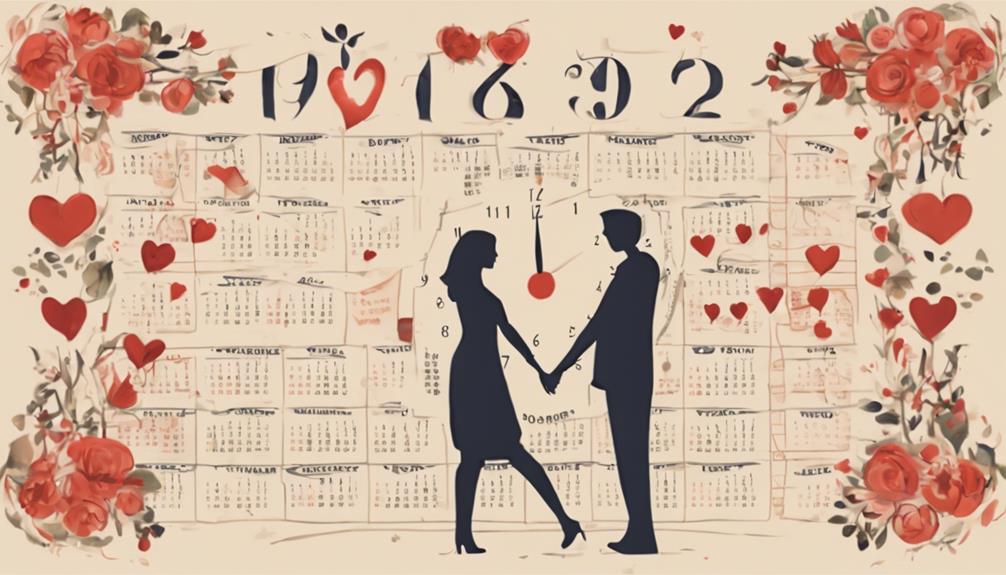It’s perfectly okay to get engaged after a year if your relationship feels secure and you both share mutual love. The average timeline might suggest longer, but every relationship is unique. What’s essential is that you openly discuss your future, share values, and effectively communicate. Evaluate how you’ve navigated life milestones and resolved conflicts together. Ascertain you’re both ready for the commitment and not swayed by external pressures. If you both feel emotionally mature and aligned on long-term goals, a year can be enough. Exploring these aspects can help confirm if you’re ready to move forward together.
Average Engagement Timelines

Engagement timelines often evoke a sense of curiosity, as they vary widely among couples. While the average dating period before engagement in the U.S. hovers around 2.5 years, many couples choose to get engaged after a year. This decision often depends on the individuals’ unique circumstances and their readiness to move forward.
For some, a year offers ample time to understand each other, assess compatibility, and face challenges together, fostering a strong foundation for the future. Around 30% of couples do get engaged within two years, highlighting that getting engaged after a year isn’t unusual.
Although shorter engagements might seem rushed to some, they can still lead to fulfilling marriages if both partners feel emotionally secure and aligned in their goals. However, it’s important to recognize that a longer dating period—like three years—can contribute to relationship stability, as couples have more time to grow and understand each other.
The average engagement length reported for U.S. couples married in 2023 was roughly 15 months, showcasing how diverse engagement timelines can be. Choosing the right timeline should depend on personal feelings and open communication rather than societal norms.
Assessing Relationship Readiness
Determining if you’re ready to get engaged after a year involves evaluating key aspects of your relationship.
It’s vital to guarantee that both you and your partner have established a solid foundation of mutual love and commitment. Relationship readiness isn’t just about how long you’ve been together but how well you’ve communicated and navigated challenges as a team.
Consider these factors to assess your readiness:
- Mutual Love: Guarantee that you both deeply care for each other and have shown consistent affection and support over time.
- Open Discussions: Have candid conversations about your future, addressing any doubts or concerns to avoid surprises later.
- Strong Communication: Evaluate how effectively you communicate, especially during disagreements, as this sets the tone for resolving future conflicts.
- Shared Values: Align on core beliefs and life goals, which are essential for long-term compatibility.
- Significant Life Milestones: Reflect on whether you’ve experienced key life events together, such as moving in, traveling, or facing adversity, as these can strengthen your bond.
Key Relationship Milestones

Building a strong relationship involves reaching key milestones that signal readiness for deeper commitment. One important milestone is evaluating compatibility, which often becomes clearer as you move past the honeymoon phase. This phase can last up to two years, and when it’s over, you start seeing each other’s true selves.
By this point, you should have a good grasp of each other’s values, habits, and long-term goals, which are essential for a lasting relationship.
Getting engaged after a year might seem fast to some, but it can be the right choice if you and your partner have communicated openly and effectively. Communication is fundamental in understanding each other’s future plans and ensuring mutual readiness for the next step.
It’s imperative to discuss topics like finances, children, and career aspirations to align your lives harmoniously.
Another key milestone is maneuvering and resolving conflicts together. Successfully managing challenges indicates emotional maturity and stability, both important for engagement.
While many couples take around 2.5 years to decide to get engaged, moving forward after just one year can work if you’ve built a solid foundation based on trust, understanding, and shared objectives.
Evaluating Personal Circumstances
Evaluating personal circumstances plays an essential role in deciding whether getting engaged after a year is right for you. The decision to advance your relationship to an engagement involves reviewing several critical aspects of your partnership and individual growth.
First, reflect on your personal readiness to commit. Are you confident in the strength of your relationship dynamics? Have you and your partner demonstrated mutual commitment throughout your time together?
Here are some questions to reflect on:
- Personal Readiness: Are you emotionally and mentally prepared for the responsibilities that come with an engagement?
- Relationship Dynamics: How do you and your partner communicate and resolve conflicts?
- Mutual Commitment: Have you both expressed a desire for a shared future and long-term goals?
- Individual Maturity: Have you both shown growth and understanding in your personal and shared experiences?
- Shared Experiences: Have you navigated significant milestones or challenges that tested your partnership?
These elements help determine if a one-year timeline is suitable for your engagement. A strong foundation built on individual maturity and mutual goals can indicate readiness.
Trust your instincts and honest conversations with your partner to guide this important decision.
Navigating External Pressures

External pressures, like societal expectations and opinions from friends and family, can heavily influence your decision to get engaged after a year. These pressures might make you question your relationship dynamics and engagement motivations, potentially clouding your judgment. It’s essential to remember that your personal readiness, not external opinions, should guide your decision.
When dealing with external pressures, open communication with trusted individuals can be invaluable. While friends and family often express concerns out of care, it’s important to prioritize your own feelings. Consider their perspectives, but weigh them against your unique experiences and relationship insights. This approach helps you maintain a balanced view, guaranteeing that societal norms don’t overshadow your authentic desires.
Evaluating your relationship together can also mitigate the impact of external pressures. Discuss your engagement motivations openly with your partner, focusing on mutual understanding and commitment. This dialogue reinforces that your decision is based on shared goals and personal readiness, not just external expectations.
Conclusion
Ultimately, whether it’s okay to get engaged after a year is up to you and your partner. Trust your instincts and the bond you’ve built. You’ve navigated key milestones and assessed your readiness together, making your relationship unique and personal. Don’t let external pressures dictate your timeline. Open communication about your shared future is essential. If you both feel ready and excited about this commitment, embrace it. Your journey is yours to define.



